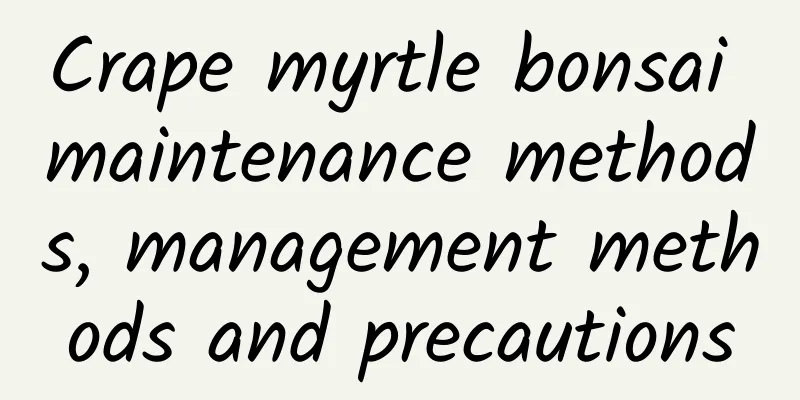Crape myrtle bonsai maintenance methods, management methods and precautions

|
Crape myrtle prefers a relatively warm and humid environment. It is a semi-shade plant. It grows in deep, fertile sandy loam and is very drought-resistant. Do not water it too much to avoid overwatering. It likes warmth, is very cold-resistant, and has relatively strong resistance to pollution. As long as you master the correct cultivation method, crape myrtle is easy to cultivate. Crape Myrtle Bonsai Maintenance Method1. Soil Crape myrtle has strong vitality. It likes fertile soil and is very drought-resistant. Crape myrtle can grow well in both calcium and acidic soil. It is best to plant it in deep and fertile sandy loam. 2. Watering Crape myrtle is drought-tolerant but afraid of waterlogging. It can be watered once before spring and after autumn every year. Normally, it does not need to be watered unless it is too dry. 3. Sunlight Crape myrtle bonsai likes light and can be placed in a sunny and ventilated environment. If the crape myrtle does not get light for a long time, its flowers will decrease or not bloom, and sometimes it will even grow weak. Things to note when planting crape myrtle bonsaiCrape myrtle can be said to be a semi-shade plant. It needs sunlight during maintenance, but its position should also be adjusted and placed according to the light intensity of the season. It is also a drought-resistant plant and does not need too much water. Twice a day in summer, the lower the temperature, the less water is required. In winter, you don’t need to water the crape myrtle. Crape myrtle is a fertilizer-loving plant and has relatively high requirements for fertilizer. Fertilize it frequently during the later maintenance process. The best fertilizer is liquid fertilizer, and the principle of applying thin fertilizer frequently should be implemented. |
<<: What vegetables are suitable for growing in winter?
>>: Maintenance methods and management of Chinese photinia bonsai cultivation and care techniques
Recommend
When is the best time to sow Coreopsis seeds?
Coreopsis seeds sowing time Coreopsis is suitable...
How often should I water my iron tree?
How often should I water my iron tree? The cycad ...
Can the cut branches of the fortune tree be planted alive? Can the cut branches be planted alive?
Can the money tree be pruned and transplanted? Th...
When is the best time to prune the lucky tree? How to prune the branches and leaves of the lucky tree
1. Pruning time The lucky tree is usually pruned ...
How to repot a newly bought azalea (how to repot a newly bought azalea)
How to repot azaleas bought online Azalea is a fl...
How long does it take for peach egg leaves to germinate?
How long does it take for peach egg leaves to ger...
Pest and disease control of Chinese cabbage
Clubroot This disease mainly harms below the grou...
How to grow sedge
1. Land preparation The land to be planted should...
What's wrong with the yellow leaves of Monstera? Does the black stem mean the roots are rotten?
1. Causes and solutions for yellow leaves 1. Its ...
How to care for newly bought Verbena
1. How to grow the newly bought Verbena Verbena i...
Jasmine varieties, what does jasmine look like (pictures of jasmine)
1. Jasmine Varieties There are about 200 differen...
Rose planting method, rose pictures
1. Choose flower seedlings When planting, choose ...
How to hydroponically cultivate Guangdong Evergreen
Guangdong Evergreen Hydroponics: Root Washing Met...
What flowers are suitable for planting in the south in summer? Flowers suitable for planting in the south
What flowers are suitable for planting in the sou...
Diseases of Prunus mume and their solutions
powdery mildew Symptoms When the disease first oc...









